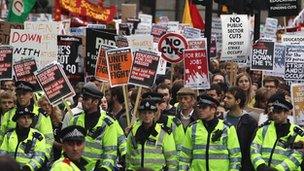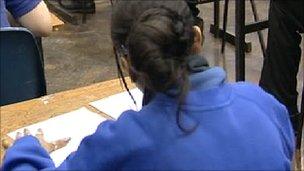The most popular education stories of 2011
- Published

The rising cost of university fees was the most consistent topic of interest for readers
What education stories did you really want to read about during the year?
Announcements that were so compulsively interesting that they had to be re-announced several times? Big ideas from big thinkers with big ambitions? Politicians kicking sand in each others' faces?
Not really, according to the most-read education news stories from the BBC News website.
The single most popular education story in 2011 was about the financial cost of poor spelling.
This attempt by an online entrepreneur to calculate the impact of poor spelling clearly struck a chord.
Errors in exam papers this summer, such as multiple choice questions where all the answers were wrong, proved to be a highly popular topic.
A story about students facing an impossible question took second place - and further exam-board howlers made appearances in this education festive top 40.
Higher appeal
But the overall most popular topic among the top 40, by a long distance, remained university tuition fees and related stories about student funding and admissions.
This topic seemed to get the pulses racing - occupying about a third of the top 40.
Pressure on university places, student protests, chopping and changing over fee levels, Oxbridge entries, how many institutions were charging top fees, graduates stuck in non-graduate jobs, loan repayment stories, more competition between universities, were all big hitters.
The only politician whose name appears in any of the top 40 headlines was David Cameron - for his intervention in the row over whether extra university places would be created for the rich.
An important observation is that the way of gathering reader figures changed in April - so these comparisons do not include the first three months of 2011.
Since the student fee debate was still loud and angry in that early part of the year, it's safe to say that this topic would have been even more emphatically the most sought-after by readers.
Even the smaller and relatively trouble-free student protest march in the autumn was the fourth most-read education story.
Conspicuous by their absence are topics which might have been seen as the policy changes catching the eye of the movers and shakers.
Academies, free schools, spending cuts, pupil premiums, inspection changes, compulsory subjects, coasting schools, the English Baccalaureate, admissions codes, faith schools, teaching qualifications, all failed to trouble the scorers.
The teachers' strike, the biggest for a generation, only managed a glancing nod, not even in the top 30.
Food for thought
So what stories did people want to read?
There seems to be some kind of tangibility factor that appeals to readers - something that relates to their own experience or which has a relevance to their own family.
These were subjects such as summer-born children, the school leaving age and family-friendly places to live.
School meals have always been a big topic with readers - and Jamie Oliver's warning about the erosion of the good food message in schools was very popular, reaching seventh place.

Maths students were set a question that was impossible to answer in an AS-level exam
Stories about gender seem to draw readers, whether it's about the gap between the results of boys and girls or the pressures on girls growing up in an over-sexualised culture. This speech by the head of the Girls School Association proved to be one of the most read stories of 2011.
Whether it's a sign of anxious economic times, there was interest in stories around financial pressures on families, child poverty and social divisions, such as the stark divide in qualification levels in different regions, which was the fifth most-read story.
Youth unemployment increases - specifically those not in education, training or work - ranked in the top 10 stories.
Stories are now spread through the digital rainforest of social networking - and there are figures showing what Facebook users shared from among education stories.
The cost of bad spelling was the most popular, alongside the struggles of summer-born children and concerns about family poverty.
In the immediate aftermath of the summer riots, the education story being shared on Facebook was head teachers challenging parents to take more responsibility.
And the most searched term, aside from the generic "education", was perhaps unsurprisingly "school league tables".
What does this all mean for next year? Aside from the inescapable impact of the unexpected, it means that the "big stories" for next year will be decided by the readers rather than those writing the news diaries.
- Published27 December 2011
- Published27 December 2011
- Published27 December 2011